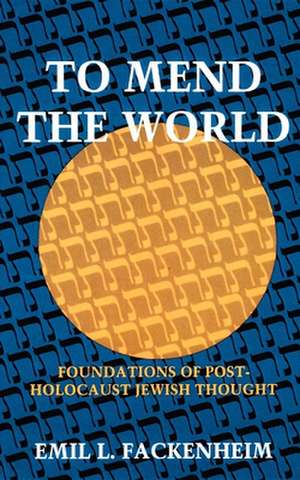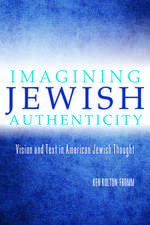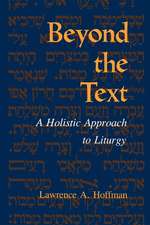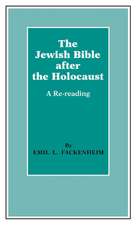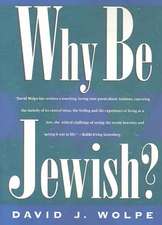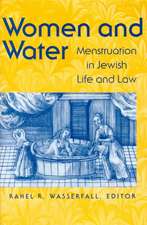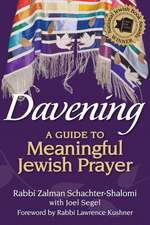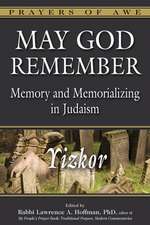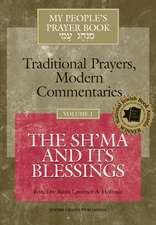To Mend the World – Foundations of Post–Holocaust Jewish Thought
Autor Emil L. Fackenheim, Inc. George Borcharden Limba Engleză Paperback – 21 iun 1994
Preț: 153.86 lei
Nou
Puncte Express: 231
Preț estimativ în valută:
29.44€ • 30.82$ • 24.36£
29.44€ • 30.82$ • 24.36£
Carte disponibilă
Livrare economică 17-31 martie
Livrare express 28 februarie-06 martie pentru 30.16 lei
Preluare comenzi: 021 569.72.76
Specificații
ISBN-13: 9780253321145
ISBN-10: 025332114X
Pagini: 408
Dimensiuni: 127 x 202 x 29 mm
Greutate: 0.49 kg
Editura: MH – Indiana University Press
ISBN-10: 025332114X
Pagini: 408
Dimensiuni: 127 x 202 x 29 mm
Greutate: 0.49 kg
Editura: MH – Indiana University Press
Textul de pe ultima copertă
Tikkun--the mending of the world and the faith of the contemporary Jew after the Holocaust--is the theme that Emil Fackenheim addresses in his most important book. Fackenheim looks to the great philosophers of Western thought--Spinoza, Rosenzweig, Hegel, and Husserl--seeking answers to the moral debasement this century has witnessed.
Cuprins
Acknowledgments
Preface to the Second Edition
Preface to the Midland Edition
Auschwitz as Challenge to Philosophy and Theology
I. Introduction
1. Introductions
2. Systems
3. Revelation
4. The Holocaust
5. "Foundations of Future Jewis Thought": Genesis of a Plan
6. "Foundations": From Plan to Execution
7. Napoleonic and Related Strategies
8. Language
9. Toward Future Jewish Thought
II. The Problematics of Contemporary Jewish Thought: From Spinoza Beyond Rosenzweig
1. Introducting Spinoza and Rosenzweig
2. Baruch Spinoza
3. Franz Rosenzweig
4. Spinoza and Rosenzweig Today
5. Conclusion
III. The Shibboleth of Revelation: From Spinoza Beyond Hegel
1. Rosenzweig on Hegel
2. Hegel on Judaism and Spinoza
3. Revelation as Shibboleth
4. The Basis of Hegel's Mediating Thought-Activity
5. Spinoza dn Hegel on Revelation
6. The Core of the Hegelian Mediation
7. Hegel's Mediation between Spinoza and Judaism
8. The Failure of Hegel's Mediation and Its Dialectical Results
9. The Move toward the Extremes
10. The End of the Constantinianism and the Turn to Dialogical Openness
11. Catastrophe
12. The Shibboleth of Revelation in Jewish Modernity
IV. Historicity, Rupture, and Tikkun Olam ("Mending the World"): From Rosenzweig Beyond Heidegger
1. Spinoza, Rosenzweig, and Heidegger on Death
2. Historicity
3. Historicity and Transcendence
4. The Ontic-Ontological Circle
5. 1933: Year of Decision
6. The Age of Technology and the Age of Auschwitz
7. Unauthentic Thought after the Holocaust
8. The Spectrum of Resistance during the Holocaust: An Essay in Description and Definition
9. Resistance as an Ontological Categary: An Essay in Critical Analysis
10. Rupture, Teshuva, and Tikkun Olam
11. Historicity, Hermeneutics, and Tikkun Olam after the Holocaust
12. On Philosophy after the Holocaust
13. Concerning Post-Holocaust Christianity
14. Jewish Existence after the Holocaust
15. Epilogue
V. Conclusion: Teshuva Today: Concerning Judaism After the Holocaust
1. The Problematics of Teshuva in Our Time
2. Rosenzweig after Heidegger
3. Yom Kippur after the Holocaust
4. The Message of Beit Ha-Tefutsot
5. The Sharing of Teshuva after the Holocaust
Abbreviations
Notes
Index
Preface to the Second Edition
Preface to the Midland Edition
Auschwitz as Challenge to Philosophy and Theology
I. Introduction
1. Introductions
2. Systems
3. Revelation
4. The Holocaust
5. "Foundations of Future Jewis Thought": Genesis of a Plan
6. "Foundations": From Plan to Execution
7. Napoleonic and Related Strategies
8. Language
9. Toward Future Jewish Thought
II. The Problematics of Contemporary Jewish Thought: From Spinoza Beyond Rosenzweig
1. Introducting Spinoza and Rosenzweig
2. Baruch Spinoza
3. Franz Rosenzweig
4. Spinoza and Rosenzweig Today
5. Conclusion
III. The Shibboleth of Revelation: From Spinoza Beyond Hegel
1. Rosenzweig on Hegel
2. Hegel on Judaism and Spinoza
3. Revelation as Shibboleth
4. The Basis of Hegel's Mediating Thought-Activity
5. Spinoza dn Hegel on Revelation
6. The Core of the Hegelian Mediation
7. Hegel's Mediation between Spinoza and Judaism
8. The Failure of Hegel's Mediation and Its Dialectical Results
9. The Move toward the Extremes
10. The End of the Constantinianism and the Turn to Dialogical Openness
11. Catastrophe
12. The Shibboleth of Revelation in Jewish Modernity
IV. Historicity, Rupture, and Tikkun Olam ("Mending the World"): From Rosenzweig Beyond Heidegger
1. Spinoza, Rosenzweig, and Heidegger on Death
2. Historicity
3. Historicity and Transcendence
4. The Ontic-Ontological Circle
5. 1933: Year of Decision
6. The Age of Technology and the Age of Auschwitz
7. Unauthentic Thought after the Holocaust
8. The Spectrum of Resistance during the Holocaust: An Essay in Description and Definition
9. Resistance as an Ontological Categary: An Essay in Critical Analysis
10. Rupture, Teshuva, and Tikkun Olam
11. Historicity, Hermeneutics, and Tikkun Olam after the Holocaust
12. On Philosophy after the Holocaust
13. Concerning Post-Holocaust Christianity
14. Jewish Existence after the Holocaust
15. Epilogue
V. Conclusion: Teshuva Today: Concerning Judaism After the Holocaust
1. The Problematics of Teshuva in Our Time
2. Rosenzweig after Heidegger
3. Yom Kippur after the Holocaust
4. The Message of Beit Ha-Tefutsot
5. The Sharing of Teshuva after the Holocaust
Abbreviations
Notes
Index
Notă biografică
Emil L. Fackenheim, George Borchardt, Inc.
